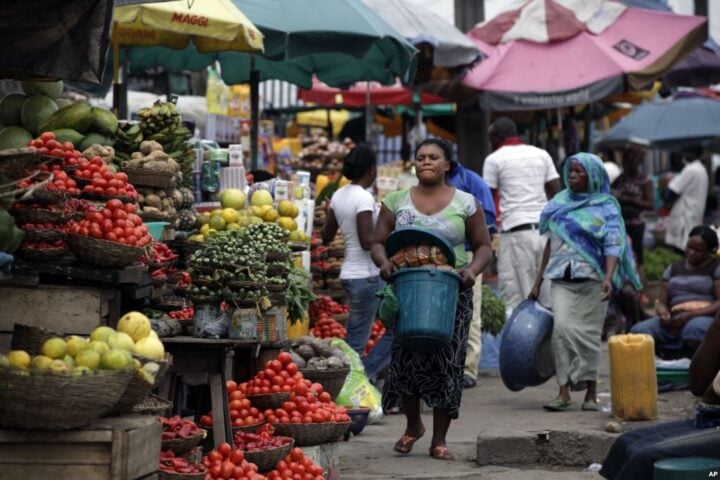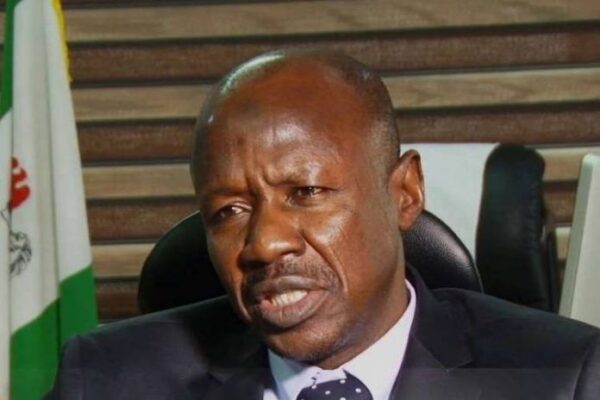As cases of student death become more magnified, largely due to social media outrage, the efforts, actions and inaction of law enforcement officers are increasingly coming under scrutiny. Central to these cases are the police who are tasked with investigating the circumstances that claimed the lives of the students involved. However, some of these cases either drag on for too long or go unresolved. In the second and concluding part of this series on student death cases, TheCable’s STEPHEN KENECHI examines how corruption frustrates the quest for justice and the policy gaps that worsen bullying and harassment in schools.
Inside police probe of Keren Akpagher’s death
She died on June 22, 2021, after developing sepsis from an infection caused by the condom said to have been left in her by a rapist.
It was said that this had compromised Keren’s immune system, spiked her blood sugar as an already diabetic patient, and resulted in hyperglycemia. A report issued to the family by Queen’s Hospital Abuja stated that decomposed condom particles and dead sperm were found in the girl’s vagina.
The FCT police command had commenced an investigation into the case but the family sought for it to be transferred to the force criminal investigation department (FCID), alleging the former was compromised in its handling of the matter. An autopsy was later conducted in July 2021 while the ministry of education and the National Human Rights Commission (NHRC) also waded in to probe the case.
Advertisement

The house of representatives had also directed that a DNA test be conducted on the male staff at Premiere Academy, Lugbe in Abuja, where Keren was schooling, so as to fish out the culprit. The lower legislative chamber, in December 2021, set up a panel for an investigative public hearing on the case. But, as of May 2022, nothing had been heard of the panel’s activities.
Withheld autopsy results, illegal fees before police probe
The autopsy ordered by the police was quoted in a statement by Premiere Academy as revealing that she died of diabetes. Lemmy Ughegbe, an activist who speaks for the family, told TheCable that both the FCT police and the FCID’s gender office denied the family access to the results while freedom of information (FOI) requests were ignored by the police.
“We had to engage seriously at a level where we expressed our dissatisfaction at the beginning of the investigation,” Ughegbe said. “To date, the FCT command refused to avail the family copies of the medical and autopsy report. The FCT command warned the pathologist in the case and the doctor against releasing copies to the mother of late Karen.
Advertisement
“We found that very wrong. The family of the deceased is entitled to the documents, more so in the circumstances of what killed Keren. We fought this institutional misconduct and had to seek a transfer of the case. Twice, there has been an FOI by our lawyers but the force gender office also ignored these.”
Adeola Adedipe, a legal expert, stated that a bereaved family member can only be denied access to autopsy results of a deceased where there is sufficient material evidence to establish that the family member may compromise the investigation.
Vivien Akpagher, Keren’s mother — while explaining the premise over which she sought to transfer the case from the FCT police to the FCID — alleged that the state criminal investigation department (CID) became indecisive and “compromised” in its handling of the case when it started entertaining “irreconcilable” claims against the family.
“They said they’d need mobilisation for logistics. I gave them ₦800,000. It’s been back and forth since,” she told TheCable.
Advertisement
“The police summoned me to the station saying the school told them that my son’s friends told his father that I had not been taking care of them. They said my daughter had a birthday on April 10. They also said my daughter had a boyfriend when she was in Makurdi. I asked them how all that amounted to what my daughter went through.
“Keren was in the school’s care. The birthday happened in April. Whatever happened to my daughter happened in June. If you say my daughter had a boyfriend when she was in Makurdi, she was 11 at the time. Did the boyfriend leave Makurdi to go into the Premier Academy in Lugbe and do whatever it is that happened to my Keren?
“It was more like the police was siding with the school. They couldn’t interrogate the people we pointed them to, like the house mother who stated that my daughter couldn’t walk. Immediately the school learned Keren had passed, it made a U-turn on all apologies and pointed fingers, claiming I couldn’t manage my girl when I brought her back.”
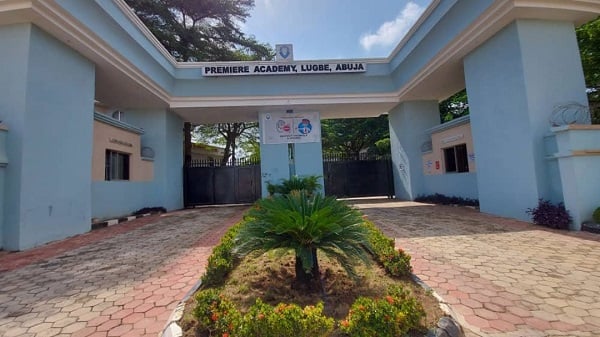
School claims CCTV footage containing ‘vital evidence’ auto-erased
Amid police probe, it was alleged Keren had left Premiere Academy Lugbe in “serious pains and barely able to walk”. This prompted the school to release footage showing her in school from June 17 to when she exited on the 19th.
Advertisement
But her mother said — based on a tip-off that Keren had been struggling since the 16th — the police asked the school to produce CCTV footage dating back to June 13 but the school said its surveillance system was programmed to erase data after every 30 days.
“They’ve given various excuses. The school has been able to produce footage of 19th when my daughter was leaving the school. If we go by 30 days, it means, after every month, the CCTV footage erases. If you can produce that of the 19th which is still in the middle of the same month, why won’t you produce that of 15th, 16th, and 17th of June?” Akpagher wondered.
Advertisement
“I hope that the police will do what is right and try to retrieve that footage. They should also interview the staffer Rita Abẹjide and Lois Bung, the nurse who fed her dexamethasone. We must know why they gave her steroids.”
On this, the activist working with the family said: “Once a crime is reported, you should manually back up footage. The school backed up 19th where Keren walked out but conveniently left out 16th and 15th. And the police seem not to see how vital those footage are. There is no basis to proceed with DNA matching and all that without getting that credible evidence.”
Advertisement
Alleged victimisation, arrest amid police probe
On the DNA sampling done to match the sperm found in Keren to her alleged rapist, Ughegbe said the family’s expert was left out of the procedure in a move he argued potentially exposes the result to being disputed.
“The case has had a lot of power play. The family needs to be carried along when they take specimens from suspects. We need to have specimens taken by our expert pathologist/microbiologist so they will process the same specimen so that there is a comparison when the results come,” he said.
Advertisement
“While we’ve been putting pressure on the government to seek justice, the school has been using its connection and funds to harass me. First, in July, the police FCT came after me at my wife’s business place to serve me a letter seeking to arrest me on the basis that I was inciting public disturbance. In the last month, I’ve also been harassed.
“The case was at the force gender office of the FCID, yet, I got a call from the state CID saying they were investigating me for criminal defamation. That case was filed against me and Keren’s mum. I had to be bailed. A team from the school management said they wanted me to pull down the hashtag “Justice for Keren” and my lawyer was aghast.
“It’s in the police’s interest to have processes diligently done in an open and transparent manner. It will help us to have common grounds and won’t start doubting whether sampling was done right. It’s global best practice.”
Approached with these claims, Chris Akinsowon, head of the school, declined to speak on the matter.
“We sued one of the vanguards, Lemmy, for defamation since December 2021 and he has received it. The mother was said to have sued the school,” the principal said in a Whatsapp message after several unanswered calls.
“We’re yet to get the writ of summon more than 10 days after they made a public announcement. Two cases are in court. I wouldn’t want to make any further statement or comment. Our explanation has never changed.”
Multiple calls and messages sent to Muyiwa Adejobi, the force spokesperson, to comment on the allegations were unanswered.
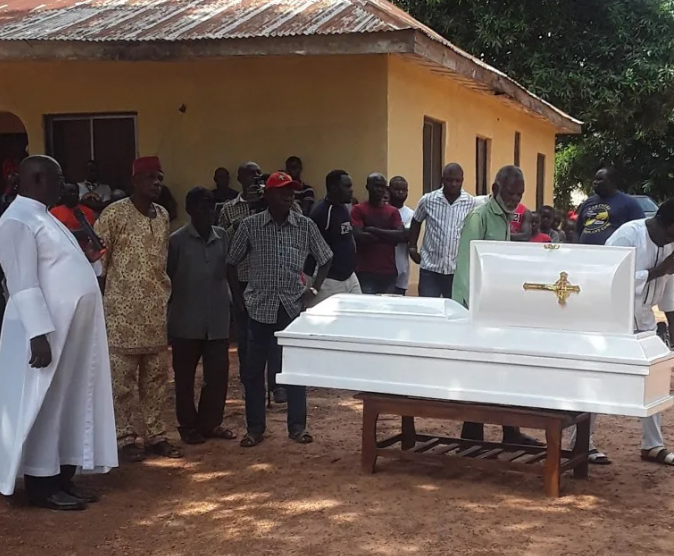
PSC: We can’t probe what is not reported
The distrust Nigerians have for the police is not new. Stories abound of victims lamenting the burden of off-the-book fees imposed on them as a condition for the police to probe reported cases. Some costs are labelled as “logistics” like refuelling police trucks and such things as buying pen and paper for statements. Others are dubbed mobilisation fees without which officers of the force may often not lift a finger. A lot of times, those who can immediately afford these illegal fees cave in while others who can’t either resort to social media callouts or risk being left to their fate.
It becomes critical in death cases as with St. Michael Boys College in Anambra where the father’s inability to pay a ₦150,000 mobilisation fee stopped the police from pursuing the case. Given the prevalent aversion to the rigours of criminal justice administration in Nigeria and associated corrupt practices, justice is easily denied to involved parties. This leaves the grieving relatives “surrendering to the will of God” as in the 2020 Bolu Omelaja case.
There is also the constant power tussle in cases of this sort and how justice administration is exposed to external influence. The IPO who headed the probe of Sylvester Oromoni’s death in Lagos wouldn’t speak on a case already before the court but a source that would rather not be quoted claimed that “powers that be” frustrated police investigation, hence the release of the arrested boys after 13 days in detention as against the court-approved 21 days.
The Police Act of 2020 provides that an officer is guilty of an offence against discipline if he/she takes or solicits bribes and gifts in general without the inspector-general’s approval — but this is more of an NPF paperwork than practice.
The Police Service Commission (PSC), the force’s civilian oversight body, doesn’t have the unhindered power to investigate and sanction erring officers. Hence, some complaints to the PSC against erring operatives end up being probed by the police itself who then revert to the commission. Ikechukwu Ani, PSC media director, said the commission delegated the power to sanction certain ranks of officers to the IGP while PSC covers senior officers.
“From inspectors up, PSC handles. If there is misconduct within that range, it goes through the normal police disciplinary process and comes to the commission where decisions are taken on them,” the PSC spokesman said.
“It’s a regimented force. We don’t go to the field to look for corrupt policemen. If there is misconduct, people report it to the police and the police do all the room trials. They bring reports to the PSC which then sits in plenary to take a stand. We’ve been doing it. If we get a petition, the commission treats it. We can’t handle the things we don’t know.
“If petitioned, we treat it or refer it to the IG. He’s the operational head. It’s not easy for the PSC to be everywhere.”
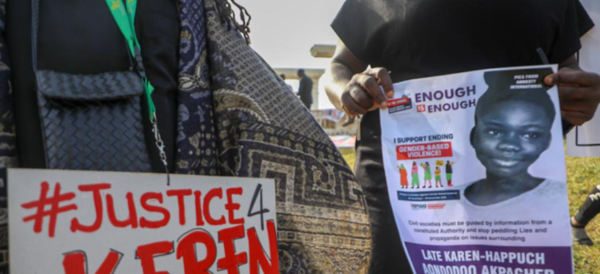
Education & anti-harassment policy in Nigeria
When a schoolchild dies in a controversial manner, the education ministry at the state level, under whose jurisdiction the school exists, deploys a team of investigators to probe. The affected school is shut in some cases until public fury drops. There is the media advocacy that later dies down and the cycle continues.
Noteworthy is the reactive nature of government response which fails to tackle the underlying education policy gaps.
There is the Child Rights Act (CRA). There is the Violence Against Persons Prohibition (VAPP) Act. The ministry of education at the federal level has a general security policy covering human-induced and natural hazards. It also touches on bullying, gender-based violence, and corporal punishment which is listed as a security threat. This was modelled as a policy guide for implementing comprehensive safety plans to provide prevention and response mechanisms.
But it is one thing to have a national policy and another to implement it at all levels. Over the years, harassment and bullying have been a major concern among boarding and day schools across the country. Most state ministries don’t have an anti-harassment policy model and most secondary schools don’t have the same uploaded on their websites.
Implementation, as it stands, remains poor. Ben Goong, education ministry press director, argued the federal ministry “can’t possibly micro-manage” all the secondary schools in the country. He said the duty to tackle the issues raised lies within the purview of the state education ministries involved.
“Education is on the concurrent list. If something happens in private schools, it’s under the purview of the state. The same goes for the FCT. FG runs, by itself, 110 Unity Colleges. If anything happens there, we investigate. Nigeria has over 26,000 senior secondary schools. It’s unrealistic to micro-managing all those,” he said.
Ebenezer Wikina, an education policy expert, argued that Nigeria needs a coordinated national response to the issue of bullying and harassment in schools, given their prevalence.
Looking at global best practices, the United Kingdom has an anti-harassment law that caters to public schools that are expected to have a domestic policy on bullying.
The UK‘s Stover School, for example, has an anti-harassment policy on its website, covering preventive measures, response strategy, and the role of the counsellor. This policy takes into account cyberbullying and the point at which police get involved. They also log data on reported cases for possible legal use.
“In Nigeria, many of these mechanisms are mostly not in place. It’s often seen as survival of the fittest, where you’re told your elders went through it as well. You shouldn’t report cases and, next day, everyone moves on,” Wikina said.
“We need to make more use of our existing system of guidance counsellors and consider the mental health side too. People have broken homes. Parents can frustrate kids who then transfer aggression to their colleagues in school.”
For years, the education community has called for six percent of the GDP and 20 percent of the national budget, respectively, to be allocated to the sector. In Nigeria, the funding gap keeps widening, with only 5.6 percent of the budget allocated to education in 2021. Therefore, policy implementation talks in the context of bullying and harassment stand the risk of being perceived as a luxury, or of little priority, given that there are other issues perceived to be more pertinent — such as lack of infrastructure, poor funding and governance, corruption, and inadequate staffing.
This is a special investigative project by Cable Newspaper Journalism Foundation (CNJF) in partnership with TheCable, supported by the MacArthur Foundation. Published materials are not views of the MacArthur Foundation.
Add a comment




